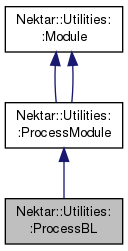|
Nektar++
|
|
Nektar++
|
This processing module calculates the Jacobian of elements using SpatialDomains::GeomFactors and the Element::GetGeom method. For now it simply prints a list of elements which have negative Jacobian. More...
#include <ProcessBL.h>


Public Member Functions | |
| ProcessBL (MeshSharedPtr m) | |
| virtual | ~ProcessBL () |
| virtual void | Process () |
| Write mesh to output file. | |
 Public Member Functions inherited from Nektar::Utilities::ProcessModule Public Member Functions inherited from Nektar::Utilities::ProcessModule | |
| ProcessModule () | |
| ProcessModule (FieldSharedPtr p_f) | |
| ProcessModule (MeshSharedPtr p_m) | |
 Public Member Functions inherited from Nektar::Utilities::Module Public Member Functions inherited from Nektar::Utilities::Module | |
| Module (FieldSharedPtr p_f) | |
| virtual void | Process (po::variables_map &vm)=0 |
| void | RegisterConfig (string key, string value) |
| Register a configuration option with a module. | |
| void | PrintConfig () |
| Print out all configuration options for a module. | |
| void | SetDefaults () |
| Sets default configuration options for those which have not been set. | |
| bool | GetRequireEquiSpaced (void) |
| void | SetRequireEquiSpaced (bool pVal) |
| void | EvaluateTriFieldAtEquiSpacedPts (LocalRegions::ExpansionSharedPtr &exp, const Array< OneD, const NekDouble > &infield, Array< OneD, NekDouble > &outfield) |
| Module (MeshSharedPtr p_m) | |
| void | RegisterConfig (string key, string value) |
| void | PrintConfig () |
| void | SetDefaults () |
| MeshSharedPtr | GetMesh () |
| virtual void | ProcessVertices () |
| Extract element vertices. | |
Static Public Member Functions | |
| static boost::shared_ptr< Module > | create (MeshSharedPtr m) |
| Creates an instance of this class. | |
Static Public Attributes | |
| static ModuleKey | className |
Additional Inherited Members | |
 Protected Member Functions inherited from Nektar::Utilities::Module Protected Member Functions inherited from Nektar::Utilities::Module | |
| Module () | |
| virtual void | ProcessEdges (bool ReprocessEdges=true) |
| Extract element edges. | |
| virtual void | ProcessFaces (bool ReprocessFaces=true) |
| Extract element faces. | |
| virtual void | ProcessElements () |
| Generate element IDs. | |
| virtual void | ProcessComposites () |
| Generate composites. | |
| void | ReorderPrisms (PerMap &perFaces) |
| Reorder node IDs so that prisms and tetrahedra are aligned correctly. | |
| void | PrismLines (int prism, PerMap &perFaces, set< int > &prismsDone, vector< ElementSharedPtr > &line) |
 Protected Attributes inherited from Nektar::Utilities::Module Protected Attributes inherited from Nektar::Utilities::Module | |
| FieldSharedPtr | m_f |
| Field object. | |
| map< string, ConfigOption > | m_config |
| List of configuration values. | |
| bool | m_requireEquiSpaced |
| MeshSharedPtr | m_mesh |
| Mesh object. | |
This processing module calculates the Jacobian of elements using SpatialDomains::GeomFactors and the Element::GetGeom method. For now it simply prints a list of elements which have negative Jacobian.
Definition at line 51 of file ProcessBL.h.
| Nektar::Utilities::ProcessBL::ProcessBL | ( | MeshSharedPtr | m | ) |
Definition at line 106 of file ProcessBL.cpp.
References Nektar::Utilities::Module::m_config.
|
virtual |
Definition at line 119 of file ProcessBL.cpp.
|
inlinestatic |
Creates an instance of this class.
Definition at line 55 of file ProcessBL.h.
|
virtual |
Write mesh to output file.
Implements Nektar::Utilities::Module.
Definition at line 124 of file ProcessBL.cpp.
References ASSERTL0, Nektar::Utilities::SplitMapHelper::bfaces, Nektar::Utilities::SplitMapHelper::bfacesSize, Nektar::Utilities::SplitMapHelper::conn, Nektar::LibUtilities::eBoundaryLayerPoints, Nektar::LibUtilities::eBoundaryLayerPointsRev, Nektar::Utilities::SplitMapHelper::edge, Nektar::Utilities::SplitEdgeHelper::edge, Nektar::Utilities::SplitEdgeHelper::edgeVert, Nektar::LibUtilities::eGaussLobattoLegendre, Nektar::LibUtilities::eHexahedron, Nektar::LibUtilities::eModified_A, Nektar::LibUtilities::eModified_B, Nektar::LibUtilities::ePrism, Nektar::LibUtilities::eQuadrilateral, Nektar::ParseUtils::GenerateSeqVector(), Nektar::Utilities::GetElementFactory(), Nektar::Utilities::helper2d(), Nektar::Utilities::SplitMapHelper::inc, Nektar::Utilities::SplitEdgeHelper::inc, Nektar::iterator, Nektar::Utilities::SplitMapHelper::layerOff, Nektar::Utilities::Module::m_config, Nektar::Utilities::Module::m_mesh, Nektar::Utilities::SplitMapHelper::offset, Nektar::Utilities::SplitEdgeHelper::offset, Nektar::LibUtilities::PointsManager(), Nektar::Utilities::Module::ProcessComposites(), Nektar::Utilities::Module::ProcessEdges(), Nektar::Utilities::Module::ProcessElements(), Nektar::Utilities::Module::ProcessFaces(), Nektar::Utilities::Module::ProcessVertices(), Nektar::Utilities::SplitMapHelper::size, and Nektar::Utilities::SplitEdgeHelper::size.
|
static |
Definition at line 58 of file ProcessBL.h.
 1.8.1.2
1.8.1.2